With crowds gathered and news helicopters circling overhead, the Gay Head Light began its slow march to safety last spring, arriving two days later well east of the eroding clay cliffs. The historic brick-and-masonry tower traveled 129 feet, almost imperceptibly along massive steel beams coated in Ivory soap.
Len Butler, who had helped lead the relocation effort over the last several years, welcomed the lighthouse to its new home with a toast and the smash of a champagne bottle on May 30. “Cheers to the Gay Head Light!” he said to much cheering and applause from the crowd. A few days later, the Aquinnah selectmen established a town holiday to commemorate the move, which selectman Jim Newman said had set an example for the Island.
Looking back at 2015, the 400-ton lighthouse, inching its way back from the cliff after months of intense preparation, surrounded by the many people who made it happen, is a fitting metaphor for the year, during which the Island saw a wide range of accomplishments, milestones and departures.
A small coalition with broad community support breathed new life into historic movie theatres in Oak Bluffs and Vineyard Haven. Organizations found new homes on the Island, and conservation efforts were as strong as ever. The Island said yes to elderly and youth services and a federal judge said no to a casino in Aquinnah.
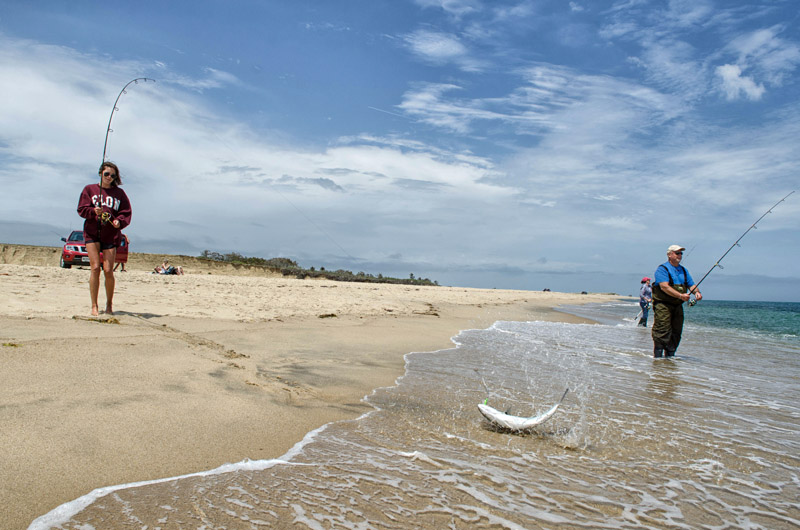
For year-rounders, enduring two blizzards and record snowfall was an accomplishment in itself, and people were eager to move on when spring came around. But the harsh winter left its mark. Thick ice on Island ponds left some shellfishermen with fewer fishing days than any time in recent memory, and heavy snowfall strained plow services and municipal budgets. A historic chimney on Cape Pogue toppled in the January blizzard.
Birds and other wildlife suffered the most. By late February, with frigid temperatures, ice-covered ponds and heavy snow, many more birds were depending on feeders. Barn owl mortality was expected to reach 95 per cent. Even Gus Ben David, a leading Island naturalist who usually advises to let nature take its course, chose to intervene by supporting a black-crowned night-heron that had arrived in his pond the year before. “I’m breaking my own rules,” he said.
With the warmer weather came one of the busiest summer seasons in years. There was an uptick in both foot and vehicle traffic — but also an epic string of retirements and resignations across the Island.
At the regional high school, football coach Don Herman hung up his whistle after 28 years, but not before celebrating one last Island Cup victory over Nantucket. Girls lacrosse coach and program founder Betsy Dripps retired after 20 years at the high school.
Island schools superintendent James Weiss ended his Vineyard tenure after 10 years and a whirlwind speaking tour of the Island in the spring. Despite his many accomplishments, however, he was unable to leave the legacy of a new administration building. Only two towns approved the $3.9 million project at their annual town meetings in April, citing the high cost and existing problems with other Island school buildings.
Surprising many, high school principal Gil Traverso resigned in August after less than a year on the job, followed in December by Oak Bluffs school principal John Rizzo, after just six months. Both planned to move off-Island.
Adam Turner, formerly of Colchester, Conn., took over as the new director of the Martha’s Vineyard Commission, following Mark London’s retirement after 10 years in August. Michael Goldfein, the Island’s first pediatrician, also retired after 38 years.
One resignation this year was a serious point of contention.
Legal battles between the airport and the Dukes County Commission were nothing new, but after the county succeeded in replacing several airport commissioners in March, things began to change. A review by the Federal Aviation Administration in the spring cited deficiencies, including the lack of a wildlife management plan and a new aircraft rescue and firefighting building that was years behind schedule.
The FAA deficiencies were a prelude to airport manager Sean Flynn’s forced resignation after 10 years, much of which were marked by legal and political battles over how much independence the airport should have from Dukes County.
Airport commissioner Myron Garfinkle, appointed by the county in March and later elected chairman, said the commission had weighed the cost of a $235,000 severance package for
Mr. Flynn against the cost of ongoing litigation that he would be entitled to pursue. “Sometimes you have to spend thousands of dollars to make millions of dollars,” Mr. Garfinkle told the Gazette. “This is an investment we’re making in the future of the airport.”
Another sore point in the community was addressed this year, thanks to a campaign to revive two unused and decaying movie theatres in Oak Bluffs and Vineyard Haven. Edgartown businessman Mark Snider spearheaded the restoration efforts early in the year along with Martha’s Vineyard Film Society director Richard Paradise, defying many skeptics by raising $800,000 in three months. Just a few hours after the Gay Head Light came to a stop in May, the newly renovated Capawock Theatre in Vineyard Haven reopened to the public, followed a month later by the Strand Theatre in Oak Bluffs.
Carly Simon and others gave a private performance at the Capawock’s reopening in May. And when the Strand opened in June, Michael Haydn performed on solo guitar prior to a screening of Jaws on the film’s 40th anniversary. Mr. Haydn’s younger self then appeared on the screen a few moments later, along with many other Islanders who had parts in the film and will never forget the summer when Jaws came to town. Another familiar face on the screen was Bob Carroll, the storied Edgartown businessman, who died this year at age 90.
Mr. Carroll, a colorful Island character, was one of many losses for the Vineyard in 2015. Jerome Kohlberg Jr., a pioneering Wall Street businessman, philanthropist and longtime third baseman for the Chilmark softball league, died in July at age 90. Mr. Kohlberg and his wife Nancy purchased the Gazette in 2010, ushering in a new era for the paper.
The Vineyard said goodbye to Sen. Edward Brooke, Olga Hirshhorn, and local actor, playwright and all-around renaissance man Leslie Stark, who died in July at the age of 76. Trudy Taylor, matriarch of the musical Taylor family, died in October at age 92.
The Island also lost several accomplished artists whose works will continue to inspire: Poet Peggy Freydberg at the age of 107, just before the publication of her 12th book; horror film director Wes Craven, 76, who wrote a column for Martha’s Vineyard Magazine; and former Gazette columnist Will Monast at age 67. William Waterway, who founded Martha’s Vineyard Magazine and was instrumental in saving the Gay Head Light in the 1980s, died at 66.
It was a time of new beginnings.
The varsity girls tennis team came of age this year, going 22-0 and winning the division three state championship. The team was led by new coach Nina Bramhall who was named coach of the year by the Boston Globe. Everyone involved pointed to the generosity of Gerry DeBlois, who created and funds the Vineyard Youth Tennis Center where Island kids receive free tennis lessons, thanking him for his essential role in the Vineyard’s tennis achievements.
Two major groups also found new homes this year, both with strong financial support from the community. In the spring, all six towns approved spending $1.6 million for a new Center for Living to serve Island seniors, against the recommendations of three town finance committees and others who questioned the new location — the former Vineyard Nursing Association in Vineyard Haven.
And with grants from the Peter and Elizabeth C. Tower Foundation and MVYouth, the Island Wide Youth Collaborative, founded in 2013, established a new center across from the high school to provide services to children and young adults, including those struggling with addiction and mental health issues.
Some projects were less well received. In November, after months of controversy, U.S. District Judge Dennis Saylor 4th issued a detailed ruling denying the Wampanoag Tribe of Gay Head (Aquinnah) the right to convert its unfinished community center on Black Brook Road into a bingo hall. The plan was supported by many off-Island tribal members, but drew fire from across the Island when work began this summer.
Among other things, Judge Saylor said in his 40-page ruling that the tribe does not exert enough authority over its lands to qualify for gaming rights under the 1988 Indian Gaming Rights Act, which the tribe had cited all along as its green light for the project. He also ruled that the 1988 act did not supersede an earlier agreement between the town and tribe that granted land to the tribe but also required compliance with state and local laws, including a specific prohibition on gaming. An appeal is likely.
Meanwhile, the department of Housing and Urban Development, which provided $1.1 million for the community center, has granted an eight-month extension for the tribe to complete work on the community center for which it was originally intended or repay the funds.
It was a banner year for conservation across the Island. The Martha’s Vineyard Land Bank ended the year having collected $13 million as of mid December — a 38 per cent increase over 2014 and a reflection of an upward trending real estate market. The land bank collects a two-percent fee on most property transactions. The largest portion of the revenue this year came from sales in the mid-range of the market, but high-end sales were especially high. A $22 million single family home sale in Edgartown was part of a five-day run in February. In July, another Edgartown home was sold for $24.75 million.
The land bank in turn acquired just over 81 acres on the Island in 2015, including 31 acres at Tom’s Neck on Chappaquiddick and 22 acres near Ice House Pond in West Tisbury. It also partnered with the Island Housing Trust to purchase 14.8 acres off State Road in Vineyard Haven for affordable housing and land conservation.
The Vineyard Conservation Society turned 50, and began rallying support for an Island-wide plastic bag ban it has been floating to selectmen. Some town leaders already support the ban, which the VCS hopes will appear on all six town meeting warrants in the spring. The VCS also is gearing up to defend its conservation land along Moshup Trail in Aquinnah from landowners who are seeking easements through VCS property. The long-running case could affect land titles throughout Aquinnah.
Along with the lighthouse relocation, which involved local, state and federal agencies working under a tight deadline, several engineering projects moved forward this year.
A months-long public review last year led to a recommendation for Squibnocket Beach that voters unanimously approved in February without a single question from the floor. It was a dramatic shift from 2014, when voters angrily rejected a similar plan developed by the selectmen and the Squibnocket Farm Homeowners Association. Many had objected to the height of a proposed bridge in the first plan, and argued that the planning process had lacked transparency. The new plan still features a raised causeway to Squibnocket Farm, but no one has yet complained about its height. Town officials hope the project will be finished by July 2017.
And on a sunny afternoon in November, Tisbury selectman Melinda Loberg and former MVC director Mark London were the first to drive across the new drawbridge between Oak Bluffs and Tisbury, which is nearing completion after about 10 years. “We had no idea in the beginning how long this was going to take,” said Mrs. Loberg, who is chairman of the Lagoon Pond drawbridge committee. “They stuck right to the deadline.”
Island planners this year sharpened their focus on coastal ponds, nearly all of which are suffering from an overload of nitrogen from septic systems and other sources, leading to algae blooms that choke out other species. An MVC survey this year showed coastal pond water quality at the top of a list of public concerns, above transportation and even housing.
“We are at a tipping point,” Megan Ottens-Sargent, president of the Water Alliance, a network of town officials, planners and water resource experts, told the Gazette this summer. Among the advancements this year were the Island-wide fertilizer regulations that went into effect in January and a large federal grant for the Martha’s Vineyard Shellfish Group to study the ability of the wetland grass phragmites to absorb nitrogen.
Only a small portion of the nitrogen in Island ponds comes from fertilizers, according to experts, but Edgartown health agent Matt Poole, who helped develop the new regulations, believed they were a step in the right direction. “It is a low-hanging fruit to some extent, unlike hundreds of millions of dollars in sewering,” he said.
But sewering is also on the table, at least in the more densely populated down-Island towns. Oak Bluffs and Tisbury have taken steps to expand their sewer capacity around Lagoon Pond, and this year the two towns formed the Island’s first joint watershed planning committee to explore shared solutions for the Lagoon. Oak Bluffs selectman Gail Barmakian roughly estimated expanded sewering in her town would cost around $15 million.
Solutions also include shellfish aquaculture, which is known to attenuate nitrogen from the water. A new oyster program in Sengekontacket Pond for that purpose has been so successful that the town opened the pond to commercial oystering for the first time this fall. A nearly identical program is underway on the Oak Bluffs side of the pond, with a first harvest expected next year.
Despite the harsh winter, Chilmark reported one if its best scalloping seasons ever, with landings in Menemsha totaling more than $500,000. In response, the town launched a long-term initiative to cultivate a million oysters per year. But in July, town officials were baffled by the disappearance of eelgrass in Nashaquitsa Pond, an important nursery for scallops.
Meanwhile, Katama Bay was closed for two weeks this summer — its third closure in as many years — in response to cases of the oyster disease Vibrio that were traced to the bay. This time, however, scientists are using the bay as a testing ground to better understand Vibrio and how it affects oysters. An especially virulent strain of the bacteria from the Pacific Northwest has led to new protocols in the region, which by all accounts are being followed on the Vineyard. East Coast Shellfish Growers Association executive director Robert Rheault said local growers have invested in the new protocols, but “science is struggling to catch up.”
In the spring, surfcasters reveled in the return of a riptide at Wasque Point on Chappaquiddick, following the closure of Norton Point breach after eight years. And fishermen in the 70th annual Martha’s Vineyard Striped Bass and Bluefish derby this fall enjoyed a prolonged frenzy of false albacore off Lobsterville Beach in Aquinnah and the newly rebuilt Menemsha jetties.
Also in the fall, the remnants of Hurricane Joaquin led to unusually high tides in Katama Bay that cut through Norton Point again, but this time the breach was short lived. The Vineyard was spared any tropical storms or hurricanes, and hardly a snowflake has fallen since April. Temperatures in late December exceeded 60 degrees, raising concerns about the effects of climate change and El Nino on Island ecosystems. At least one person spotted a monarch butterfly on Christmas day.
It was a bittersweet year in Menemsha, where fishermen made strides to preserve the Island fishing industry, but also said goodbye to the Unicorn, a legendary dragger and one-time swordfishing vessel that had decayed over the years.
Before the ship’s final voyage to New Bedford this fall, captain Greg Mayhew sold his federal groundfish permit — the last on the Island — to the Martha’s Vineyard Fishermen’s Preservation Trust. The permit is now available for Island commercial fishermen to lease at an affordable rate, giving them a leg up in the face of increasing costs and regulations. The trust also organized the Island’s first meet the fleet event in August, drawing huge crowds to Menemsha, where local fishermen and their boats were on hand for the day.
Many fishermen welcomed the apparent demise of Cape Wind in January, after developers failed to meet their Dec. 31 deadline to secure financing, and two key investors — National Grid and NStar (now Eversource) — severed their contracts. Cape Wind president James Gordon blamed “extended, unprecedented and relentless litigation” by the Alliance to Protect Nantucket Sound, a well-funded advocacy group on the Cape, for the upset.
But the wind kept blowing, and three weeks later Vineyard Power, an Island-owned energy cooperative, along with its partner Offshore MW, won a 25-year lease of nearly 167,000 acres south of the Vineyard, where they hope to install wind turbines of their own. Vineyard Power plans to own several of the 60 or 65 turbines; a detailed plan is still taking shape.
“It’s been hard work getting to this stage,” co-op president Richard Andre told the Gazette after the lease was awarded in January. “Five years ago it seemed almost herculean. It’s a good day to pause and reflect.”
Throughout the year, the Island community was touched by regional, national and global events, including the Paris terror attacks of Nov. 13, and ongoing efforts across the country to end racial violence. In the wake of many police shootings and other acts of violence this year, the regular summer forums related to African American culture and history took on a new urgency.
Leaders from around the country asked hard questions and called on people to take action in their communities. Shortly after the shooting of nine parishioners in Charleston, S.C., in June, former Massachusetts Gov. Deval Patrick delivered a sermon at Union Chapel, reflecting on U.S. politics and the state of humanity. “Good people are becoming bystanders to injustice and unfairness,” he said. “But scripture teaches that faith demands action.”
And at the annual Hutchins Forum in Edgartown, a panel of young professionals reflected on their generation and looked toward the future.
“One of the things we fail to do a lot of times is really understand how powerful we are as individuals and as groups,” said journalist and commentator Dion Rabouin, echoing the message of many others throughout the summer.
Islanders offered an outpouring of support when photographer Yann Meersseman travelled to Paris to be with his son Arnaud, who was among those injured by terrorists at the Bataclan concert hall in November. Throughout the ordeal, Mr. Meersseman continued posting photographs on his popular Vineyard Colors page on Facebook. One image from Paris showed Arnaud leaving the hospital with an IV stand and flashing a peace sign.
On the home front, public health data released this year showed more and more people in the grip of an opioid epidemic that has hit the region in recent years. State data, along with reports from local doctors and police, show opioid abuse on the rise on the Vineyard.
“It’s your businessmen, it’s your student, it’s the mother and father, professionals, all walks of life,” Hazel Teagan, an emergency room worker at the hospital, told the Gazette. Statewide, 911 people died of heroin or prescription opioid overdoses in 2013, marking a 36 per cent increase over the previous year. State officials project a similar increase for 2015. The state reports 15 fatal overdoses on the Island between 2000 and 2014, but Island physicians believe the number is much higher.
“I counted at least six deaths last year,” said Dr. Charles Silberstein, an Island psychiatrist. “This year I’ve counted at least 10.” In collecting numbers, Dr. Silberstein said he includes people who have lived on the Island but who moved elsewhere to find a cheaper source.
“We’ve never seen this, a phenomenal epidemic here,” he said.
Public health data also revealed that Martha’s Vineyard schools have among the lowest measles vaccination rates in the state. West Tisbury was near the top of the list with a 26-per-cent exemption rate, followed closely by Tisbury with 13 per cent. Informal reports also indicate high exemption rates at the Chilmark School and the charter school. The data was released following a widely reported measles outbreak in California in January.
The regional hospital began vaccinating kids and adults in large numbers following a measles diagnosis on the Island in June, but the case was later found not to have been measles, rather a virus that caused similar symptoms. “It walked like a duck and it talked like a duck but it was a platypus,” said Dr. Jeffrey Zack, chief of emergency medicine at the hospital. Nevertheless, the episode shed light on the challenges the hospital may face in responding to an outbreak.
Another kind of outbreak caused a stir this spring, in the run-up to one of the most successful summer seasons in years. By the time the global ride-share network Uber announced its official launch on the Vineyard in May, Island taxi companies had been on the defensive for weeks, complaining to selectmen and others that the San Francisco-based company would mean their end.
“It’s going to kill us,” said Jim Hickey, owner of Bluefish Taxi and Aquinnah Taxi. “Especially a company like mine. It will be a slow death.”
But the public at large seemed to welcome the new company, which has gained traction in many cities, and whose employees drive their own cars. In online forums this spring, many Islanders complained that conventional taxis here often stand until they are full and may take longer to get around.
Others, including former MVC director Mark London and Harvard Business School professor Rosabeth Moss Kanter, have suggested that the company could help ease summertime congestion on the Vineyard — a problem that increased this year.
“Everybody I’ve talked to said there were more people out here than they’ve ever seen,” said Christine Todd, executive director of the Oak Bluffs Association, when the season began to wind down. Oak Bluffs counted more public inquiries at its information booth on Circuit avenue than any time since the records began. Pedestrian and vehicle traffic on the Steamship Authority also picked up, with 4.9 per cent more passenger trips in July (2.5 per cent in August), and similar increases for cars and trucks.
Businesses welcomed the uptick in visitors. “We had a great June, had one of the best Labor Days we’ve ever had,” said Phil Hughes, owner of the Wheel Happy bike shop in Edgartown. “The weather cooperated. I definitely think the economy is stronger. This year people were ready to spend.”
The Obamas made their annual summer visit to the Island again, but by now the occasional traffic delays and interruptions seemed routine. Mr. Obama’s summer reading list included Ta-Nehisi Coates’s bestseller Between the World and Me, which takes an intimate look at institutional racism in the U.S. and was featured in this year’s Martha’s Vineyard Book Festival. Mr. Coates appeared with NPR journalist Michele Norris for a well-attended public conversation to kick off the festival in August.

The conversation focused on the idea of a post-racial America, which Mr. Coates saw as wishful thinking. Reflecting on the national attention and protests surrounding violence toward African Americans, he alluded to the growing influence of technology and the Internet. “There is nothing new about what is happening,” he said. “But it’s new that people are seeing it.”
And at summer’s end, the departures continued. Martha’s Vineyard Hospital director Timothy Walsh announced his retirement, and Martha’s Vineyard Museum director David Nathans said he would step down in the new year.
But on Aug. 11, under a steady downpour, it was a time of hope and a new beginning as the Gay Head Light resumed its watch over Vineyard Sound and the waters off Aquinnah. Despite the rain, a large crowd gathered at Aquinnah Circle to see the red-and-white beacon come back to life after its longest period of darkness since 1859. A loud cheer arose when the lantern began sweeping through the fog and rain.
“We did this for everybody,” said Mr. Butler, as rain pelted the tent where people celebrated — wet but happy — into the evening. Next up for the lighthouse is a long-term restoration project, with work on the tower expected to begin in the spring.


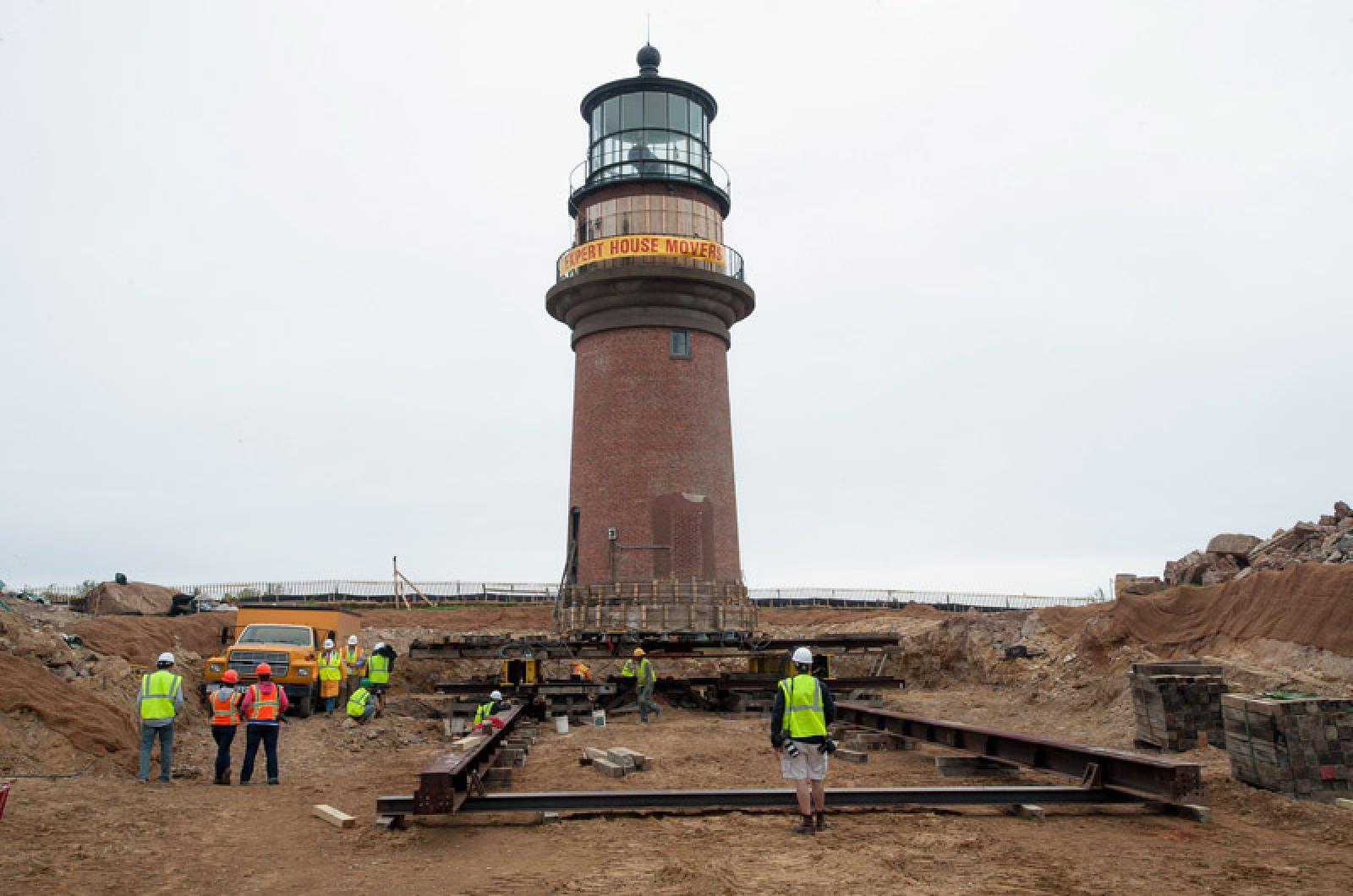



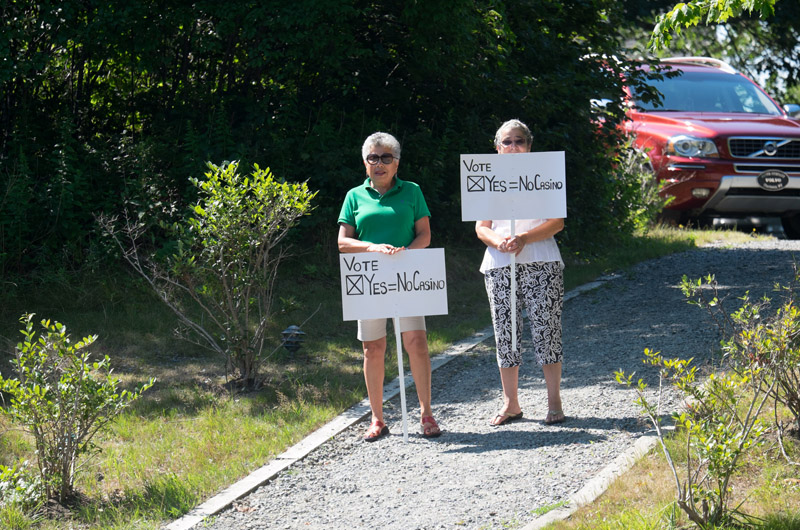
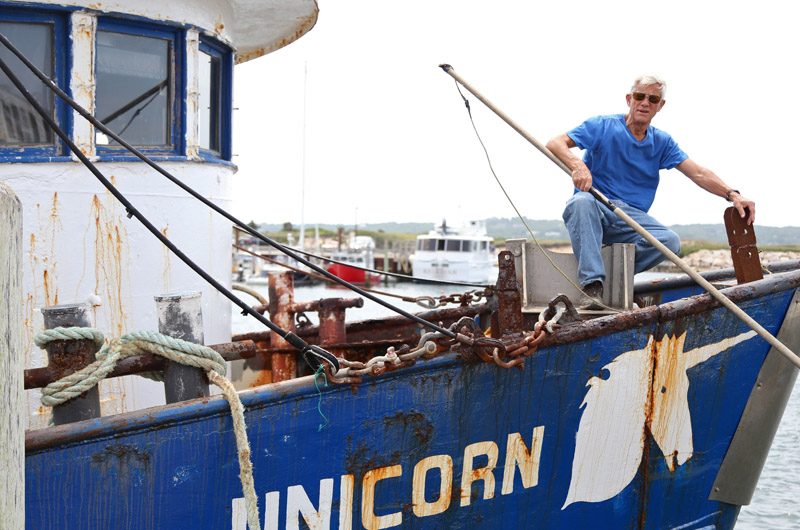

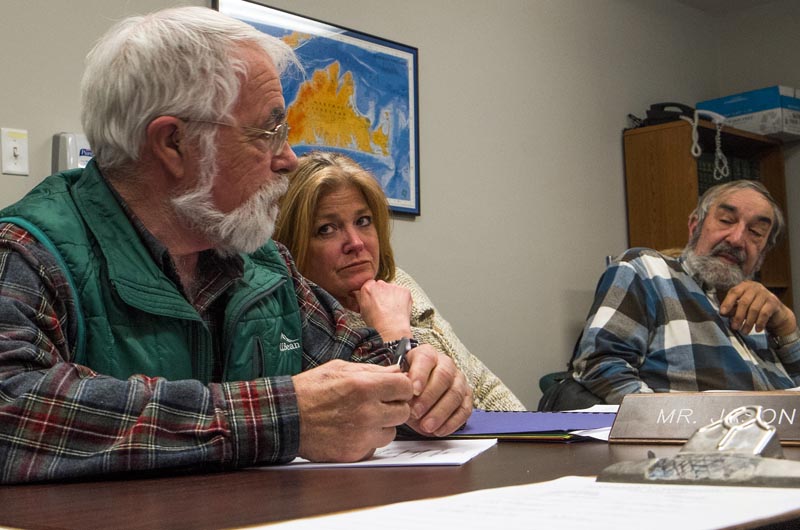


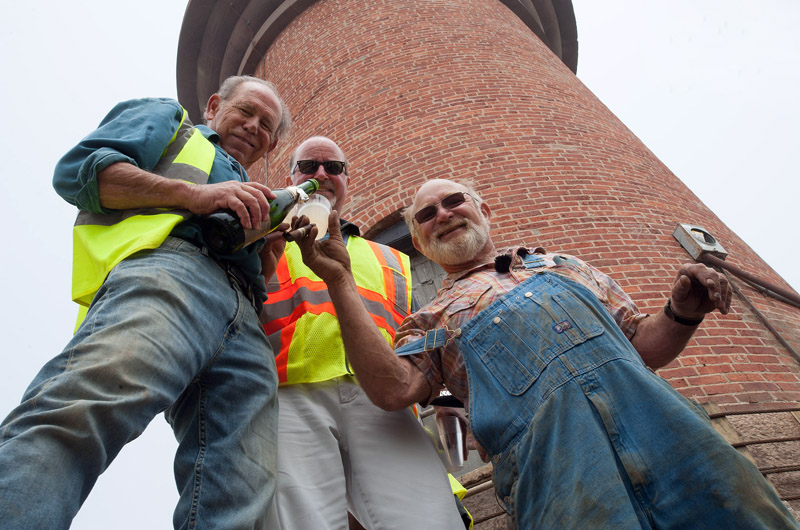







Comments
Comment policy »